ISLAMABAD: An overwhelming majority of Pakistani garment workers have suffered wage losses that were actually wage theft by global brands during COVID-19 lockdowns, a recent study shows.
Wage theft — the denial of wages or employee benefits — is endemic in global garment supply chains due to power asymmetry between brands, suppliers, and workers, and was escalated by COVID-19 lockdowns, according to the report by Asia Floor Wage Alliance (AFWA), which interviewed workers from 189 factories in Sri Lanka, Pakistan, India, Indonesia, Cambodia and Bangladesh.
In Pakistan, the garment sector is the country’s second largest employer, accounting for around 8.5 percent of GDP and almost 70 percent of its exports. Despite the pandemic, it continued to grow with garment exports increasing to $15.5 billion in fiscal year 2020-21 from $12.6 billion in 2019-20.
AFWA interviewed 605 workers from 50 garment factories across three districts in Pakistan’s Punjab and Sindh provinces — Faisalabad, Lahore and Karachi — suppliers were left short of cash to pay workers as brands refused to pay for shipments that had already been delivered or canceled orders for which factories had already purchased supplies.
“Garment workers in Pakistan faced some of the highest levels of wage theft in the Asian garment industry during the COVID-19 crisis due to the imposition of provincial COVID-19 lockdowns,” AFWA said in its report, “Money Heist: COVID-19 Wage Theft in Global Garment Supply Chains.”
“All workers in our survey experienced employment shocks either in the form of layoffs (86 percent) or terminations (14 percent),” the report said.
The practice peaked in April during the total lockdown period in March-May 2020.
“Wage theft peaked in April 2020 but workers consistently experienced wage theft throughout the year, and well into 2021,” the report said. “Workers reported an overall wage theft of 29 percent in 2020, with a sharp decline in wages by 61-69 percent during the total lockdown period and 26 percent during the partial lockdown period (June-October 2020).”
It estimated that in the 50 factories surveyed, 244,510 workers were denied $85.08 million as wages due to order cancelations or non-payment for existing orders.
The situation started to improve near the year’s end as pandemic curbs relaxed, production increased, and government support started to reach garment workers.
Aliya Hamza Malik, parliamentary secretary for textile and industries, said the government had approved a Rs1.2 trillion package in March 2020, which had helped mitigate the economic fallout from the COVID-19 outbreak.
“We gave a relief package to the industry to help them pay salaries to their workers and ensure their social security,” Malik told Arab News.
“Workers and laborers are on the top priority of our government and we will keep looking after them,” she said. “The textile sector is one of the best performing industrial sectors in Pakistan as its exports have increased from $12.6 billion last year to $15.5 billion this year.”
According to AFWA, however, around 65 percent of the workers did not receive any social security benefits even during the pre-pandemic period, with the number increasing during April-May to 80 percent.
Ijaz Khokhar, chief coordinator at the Pakistan Readymade Garments Manufacturers and Exporters Association, rejected the AFWA findings, at least in Pakistan’s “formal industrial sector.”
“Our industry employs skilled workers and cannot afford to lay them off in any short-term crisis,” he told Arab News. “We have retained our workers, paid them full salaries and additional benefits and allowances during the COVID-19 lockdowns because they are backbone of the industry.”
Most garment workers in Pakistan reported wage theft during COVID-19 crisis — survey
https://arab.news/yw5tb
Most garment workers in Pakistan reported wage theft during COVID-19 crisis — survey
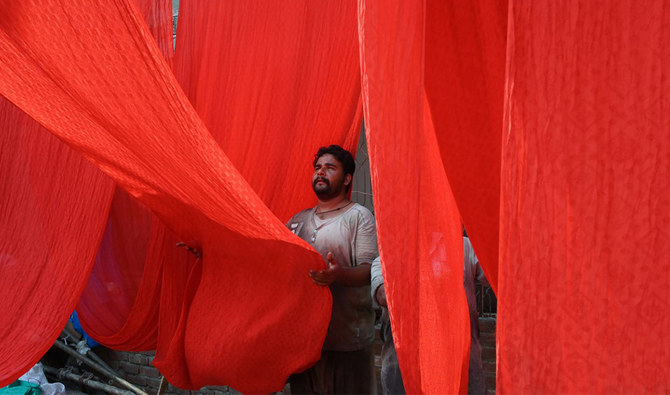
- 86 percent of garment workers in Pakistan experienced layoffs during the COVID-19 crisis, Asia Floor Wage Alliance report shows
- Textile sector is Pakistan’s second largest employer, accounting for around 8.5 percent of GDP and almost 70 percent of the country’s exports
Pakistani forces kill 6 militants in volatile northwest near Afghanistan— army

- Pakistani security forces carry out twin raids in Dera Ismail Khan, North Waziristan districts
- Such operations are often conducted against Pakistani Taliban or Tehreek-e-Taliban Pakistan group
PESHAWAR, Pakistan: Pakistani security forces killed six militants in twin raids Wednesday targeting their hideouts in the country’s volatile northwest region bordering Afghanistan, the military said.
Five militants were killed in the first raid in Dera Ismail Khan district in Khyber Pakhtunkhwa province, the military said in a statement. It did not provide further details about the slain insurgents, and only said the men were behind various previous attacks on the security forces.
Another militant was killed in the second raid in a former stronghold of the Pakistani Taliban in the North Waziristan district in the northwest.
The statement did not provide any further details about the identity of the slain men.
Such operations often target the Pakistani Taliban, which has been emboldened by the Taliban takeover of Afghanistan in 2021. Known as the Tehreek-e-Taliban Pakistan or TTP, it is a separate group but a close ally of the Afghan Taliban.
Pakistan hikes electricity prices by Rs2.83 per unit citing fuel cost adjustment
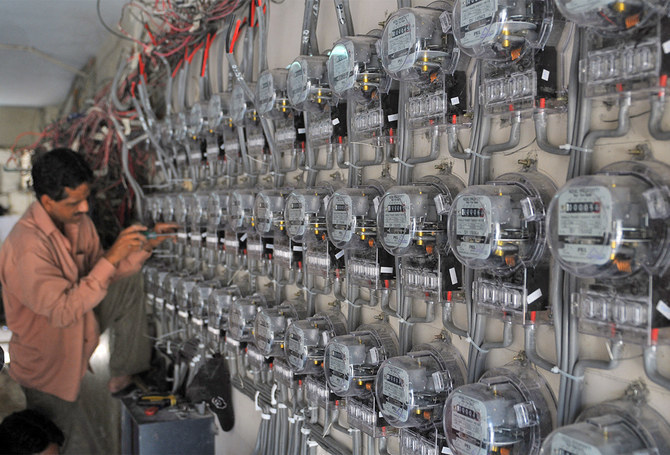
- Fuel cost adjustment for March to reflect in consumers’ bills for the month of May, says power regulator
- Pakistan has been caught in a high inflationary cycle since April 2022 due to surging food and fuel prices
ISLAMABAD: Pakistan’s National Electric Power Regulatory Authority (NEPRA) on Wednesday authorized distribution companies to levy a Rs2.83 per unit additional charge on consumers’ bills for May, with the move likely to fuel inflation in a country already suffering an economic crisis.
A notification by NEPRA seen by Arab News stated that the fuel cost adjustment pertains to March, adding that the additional charges would apply to all consumer categories except “Electric Vehicle Charging Stations (EVCS) and lifeline consumers.”
“The said adjustment shall be shown separately in consumers’ bills on the basis of units billed to the consumer in the month of March 2024,” the notification said.
Pakistan has been caught in a high inflationary spiral since April 2022, with the highest-ever inflation rate recorded at 38 percent in May 2023. The government credits soaring inflation to painful decisions it had to take to meet conditions for an International Monetary Fund (IMF) bailout program, including hiking energy tariffs and fuel prices.
Gas and electricity rates were hiked by 318.7 percent and 73 percent respectively in a year, according to official data.
The price hikes come as Pakistan is set to begin discussions with the IMF this month over a new multi-billion-dollar loan agreement after completing its nine-month, $3 billion loan arrangement with the lender.
Under the last IMF bailout, Pakistan was told to prevent further accumulation of circular debt in its power sector, arising from subsidies and unpaid bills. For a new program, the South Asian nation will need to implement reforms to reduce costs by improving electricity transmission and distribution, moving captive power into the grid, improving governance, and combating theft.
It will also have to maintain power and gas tariffs at levels that ensure cost recovery, with adjustments made to safeguard the financially vulnerable, through existing progressive tariff structures.
Senior World Bank official concludes Pakistan trip, reaffirms support for economic stability
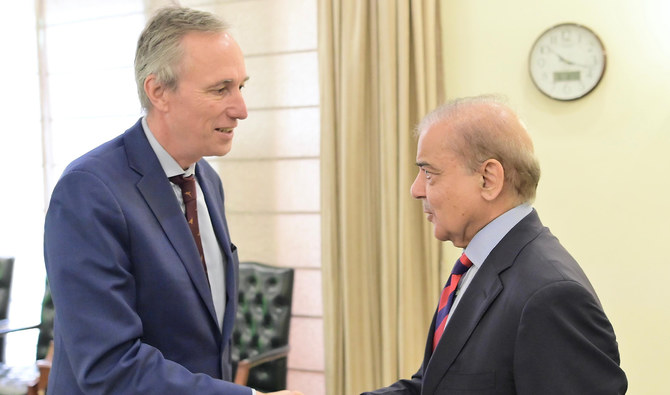
- World Bank Vice President for South Asia Martin Raiser meets PM Sharif, key officials in Islamabad
- Raiser praises Pakistan’s reform plans to boost growth, attract private investment and tackle poverty
KARACHI: A senior World Bank official concluded his three-day visit to Pakistan on Wednesday, reaffirming the international institution’s support for the country’s economic stabilization after meeting Prime Minister Shehbaz Sharif and key government officials in Islamabad.
World Bank Vice President for South Asia Martin Raiser arrived in the federal capital on May 6, with his visit taking place as Pakistan faces a chronic balance of payment crisis, forcing it to turn to the International Monetary Fund (IMF) for a new long-term bailout deal.
Pakistan has faced the challenges of revenue generation and government expenditure in the past and struggled with high levels of debt, a large fiscal deficit and an ongoing need for structural reforms to improve its fiscal sustainability.
“The World Bank Vice President for South Asia, Martin Raiser, concluded his three-day visit to Pakistan today and reaffirmed the World Bank’s support to stabilize the economy and accelerate inclusive and resilient growth,” a press release by the international institution read.
It said Raiser met Sharif, ministers of finance, water, power, energy, and petroleum, and his counterparts to discuss Pakistan’s development priorities.
“The discussions focused on economic and fiscal reforms, human capital development, adaptation to climate change, energy sector reforms, and digitalization as a foundational enabler and accelerator of development,” the World Bank added. \
Raiser said he was pleased to learn of Pakistan’s reform plans to boost growth and attract private investment, strengthen climate resilience, and invest in human capital to tackle daunting challenges such as child stunting and poverty.
The World Bank official also visited Pakistan’s northwestern Khyber Pakhtunkhwa (KP) province to meet Chief Minister Ali Amin Gandapur.
“Discussions focused on the provincial developmental priorities and how can the World Bank step up its support in key sectors, like education, water and sanitation, health, rural roads, and livelihoods,” the statement said.
He also attended a national conference on education in Islamabad, where PM Sharif also spoke. Raiser reaffirmed the World Bank’s commitment to urgent action to tackle the large number of out-of-school children in Pakistan.
PM Sharif declares ‘education emergency’ across Pakistan to enroll out-of-school children
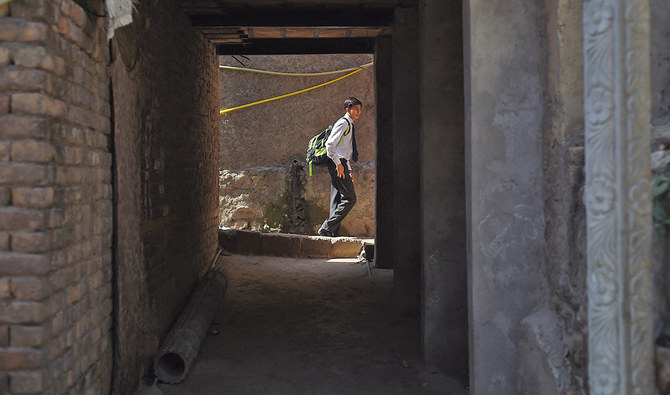
- Pakistan has one of the world’s highest out-of-school children population at 26.2 million
- PM Shehbaz Sharif says will personally oversee the national program to ensure its success
ISLAMABAD: Prime Minister Shehbaz Sharif on Wednesday declared an “education emergency” across Pakistan on Wednesday, vowing to personally oversee the program which he hoped would enroll over 26.2 million out-of-school children in educational institutions.
Pakistan has the second-highest population of out-of-school children in the world at 26.2 million, according to Unicef Pakistan. Pakistani experts have identified population growth, lack of localized strategies, and economic issues as the main reasons why over 26 million Pakistani children are not enrolled in schools across the country.
A report by Pakistan’s education ministry in January revealed that out of 26.2 million out-of-school children, 11.73 million are in Punjab, 7.63 million in Sindh, 3.63 million in Khyber Pakhtunkhwa (KP) and 3.13 million in Balochistan province.
Speaking at an event titled “National Conference on Education Emergency,” Sharif said enrolling millions of children back into schools was a “tall order” that could be achieved with conviction.
“I declare from this moment an emergency in education all over Pakistan,” Sharif told members of the conference, which included federal ministers, parliamentarians, vice-chancellors, and diplomats.
The Pakistani prime minister said he would personally oversee the national program, adding that he would meet the chief ministers of all four provinces in the country for the sake of Pakistani children and their future.
“This is about our children and our future,” Sharif said. “This is a very challenging task, no doubt. But nations which had faced difficulties and defeat in the past arose from the ashes of defeat.”
He hoped provincial governments in Pakistan would help the center in achieving its goal of promoting education in the country and transforming it into an educated nation.
“I guarantee, if we move in unison to find our space, Pakistan will become one of the most educated societies one day soon,” he remarked.
Pakistan’s first lunar satellite ICUBE-Q successfully enters moon’s orbit
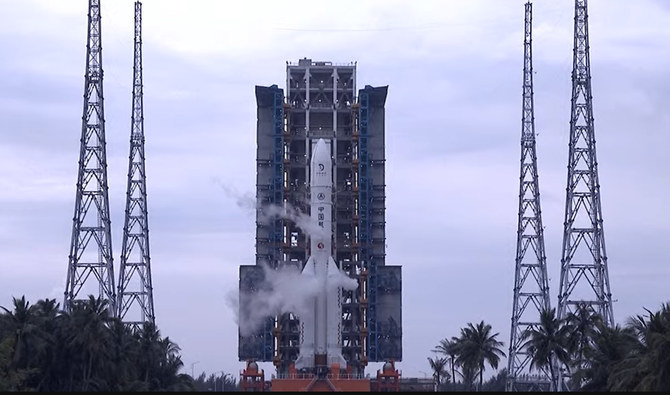
- ICUBE-Q was deployed in moon’s orbit around 1:14 p.m. Pakistan Standard Time, says Institute of Space technology official
- IST official describes development as “important” one for Pakistan allowing it to conduct “bigger” space missions in future
Islamabad: Pakistan’s first lunar satellite ICUBE-Q entered the moon’s orbit successfully today, Wednesday, a senior official of the country’s Institute of Space Technology (IST) confirmed, saying the “important” development could pave the way for “bigger” space missions for the country in the future.
The ICUBE-Qamar satellite carries two optical cameras to image the lunar surface and weighs around 7kg. Cubesats are tiny box-shaped satellites that are mainly launched into low Earth orbit to observe the Earth, test new communications technology, or perform miniature experiments.
Pakistan’s first lunar satellite was launched aboard China’s Chang’e-6 probe on May 3. The Chinese probe is tasked with landing on the far side of the moon, which perpetually faces away from the Earth, after which it will retrieve and return samples. China is the first country to make such an ambitious attempt.
“Our ICUBE-Q was deployed successfully in its orbit at 1:14 p.m. Pakistan Standard Time,” Dr. Khurram Khurshid, the head of the electrical engineering and computer science department at IST and a co-lead on the satellite project, told Arab News.
Dr. Khurshid said Pakistani officials will continue to test the satellite’s system for the next three to four days. He said initial tests revealed there were no complications with the cubesat’s system.
The IST official said the development means Pakistan is officially in an exclusive club of countries that have conducted deep space missions.
“This is the first step, a step in the right direction,” Dr. Khurshid noted. “It can lead to bigger space missions, such as landing on the moon or various other experiments.”
Dr. Khurshid said Pakistan would be able to share images from the satellite by May 15.
Around 100 students from IST contributed to developing the satellite. Pakistan’s proposal to build the satellite was accepted by the China National Space Agency (CNSA) from plans submitted by eight member states of the Asia-Pacific Space Cooperation Organization (APSCO).
The design, development, and qualification of the ICUBE-Q satellite were spearheaded by faculty members and students of the IST in collaboration with China’s Shanghai Jiao Tong University (SJTU), with support from Pakistan’s National Space Agency, SUPARCO.
The ICUBE-Q has two cameras as payload for taking images of the lunar surface that will be transmitted back to Earth for analysis.










